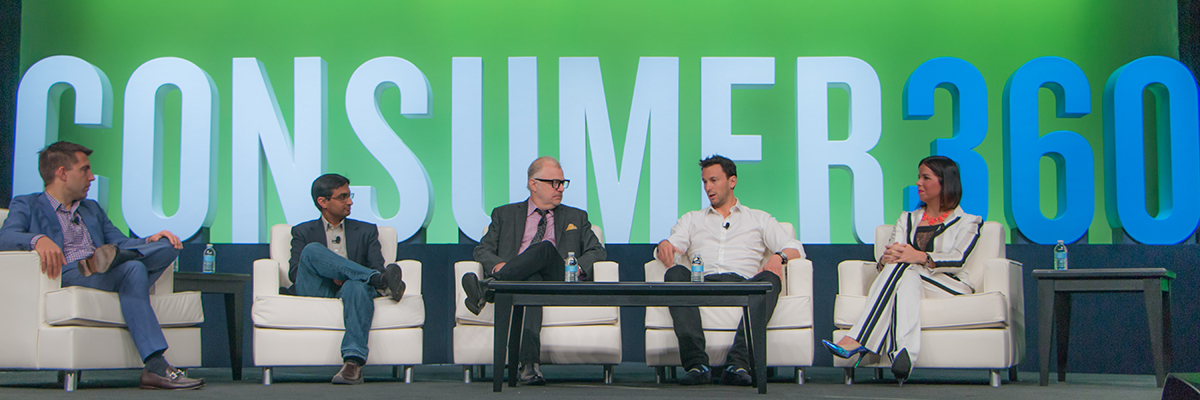With technological advancements accelerating quickly, we live in a world that continues to push the limits of potential when it comes to artificial intelligence (AI) and machine learning. New innovations and paradigms relevant to the decisions and tasks that we engage in every day will continue to evolve.
So what do these opportunities look like for businesses? To shed light on what’s ahead, Brian Stempeck, Chief Client Officer, The Trade Desk, moderated a panel at this year’s Consumer 360 event to assess the challenges and opportunities associated with these budding technologies. Panelists discussed how these breakthroughs are being developed and what they might mean for tomorrow’s business world.
But before the panel kicked off, Rajen Sheth, Senior Director of Product Management (AI), Google Cloud, provided some context about the power of AI by pointing out that the amount of data and computing power that is currently available makes it possible to do amazing things—stating that we’re now at the point where technology can start to make decisions on our behalf. And as a result, we’re in a much better place that we’ve ever been to start using it beyond the lab.
“AI will be the bedrock of computer science for the next 20-30 years. We believe this is just the beginning of something for the entire industry and we can use it to deliver something that really matters to consumers,” he said.
Rajen specifically discussed the best application of AI–human interaction—and spoke about how it will take some time for us to trust technology and to learn it–things that will be a gradual process. “Like the industrial revolution which made it possible for humans to scale their physical ability, AI is doing similar things for people’s mental capacity,” he said.
Rajen added that AI’s applications are numerous: It personalizes customer interactions, adds structure to data, provides efficiency and agility, and spots patterns to identify characteristics that resonate with your customers. He described the AI journey as one that turns insights into solutions, which starts with identifying problems, collecting data, designing algorithms and building solutions. He also talked about the current challenge within the industry of scaling the skill set of Al to bridge the talent gap for people who can develop deep learning models and making AI more accessible for everyone who has data.
So what are some of the applications of AI and what are the perspectives of leaders in the industry on the present usefulness and potential of this burgeoning intelligence?
The panel discussed the accessibility of AI and ways to make it scalable within companies and organizations so that larger amounts of people can benefit from it. With respect to scaling AI, the panel discussed the need for additional data scientists who are able to build applications that can be used by wider audiences.

When looking at it from a client perspective, it’s important to think about the end goal,” said Brian from The Trade Desk. “If you aren’t starting out with defining what success looks like, you are putting yourself at a dangerous disadvantage.”
But not all applications of machine learning are off in the future. For many businesses, including Google, AI is already helping organizations be more agile, nimble and fast-paced. And in the ad space, it’s helping manage campaigns and digital targeting.
“Ad campaigns now are so complex that it’s incredibly difficult for humans to manage them, and there is such a high volume of data that it becomes challenging,” said Jack Smith, Chief Product Officer, GroupM North America. “When you start to peel back the layers, you realize that they have very little to do with an outcome, and ultimately you can see how will you build against it and apply it in the market.”
Mark Simpson, VP, Offering Management, Watson Marketing, IBM, said that his company has been using AI (Watson) for the past few years to improve the efficiency of their programmatic ad buying. “On average, our campaigns are 35% more efficient, with spend going further using AI; so the real results coming out of that are phenomenal.”
Kelly Abcarian, SVP of Product Leadership at Nielsen, and Mark from IBM agreed that they would love to see AI be used to help businesses optimize time, allowing humans to spend their time on more important matters.
“In its rudimentary forms AI is allowing all of us to experience the effects with day-to-day applications,” said Kelly. “And we don’t realize that we’re experiencing it. All of these things are changing our behaviors and allowing us to streamline our lives.”
The panelists ended by discussing what the future of AI in business might look like. They posed opportunities in personalized customer interactions (such as call centers) and employing computers to actually answer customer questions effectively and efficiently. They also talked about the potential of augmented intelligence, whereby a computer could know enough about a specific subject or circumstance to recommend the best course of action in business scenarios.


